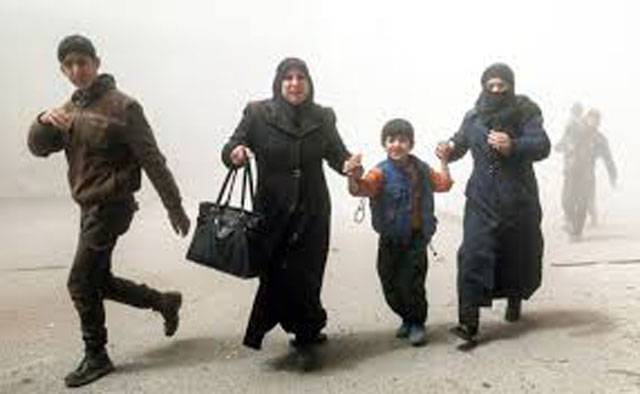THE HAGUE - Syria came under pressure Monday to fill in gaps in its declaration to the world's chemical weapons watchdog amid reports of toxic arms use during its six-year civil war, triggering angry Syrian denials.
A fact-finding mission from the Organisation for the Prohibition of Chemical Weapons (OPCW) has issued three reports showing the use of chemicals weapons in the country in recent years, OPCW chief Ahmet Uzumcu said.
"It's very disturbing that yet again we are confronted with the use of chemical weapons," Uzumcu told the annual conference of countries belonging to the Chemical Weapons Convention.
It was "vital... that the long-held international norm against chemical weapons remains strong and the perpetrators are held accountable," Uzumcu said.
The 1993 arms treaty binds all member states to help rid the world of chemical weapons.
Syria under President Bashar al-Assad finally joined in 2013, admitting under US-Russian pressure to having a toxic arms stockpile, and thus staving off threatened US air strikes.
Syrian deputy foreign minister Faisal Mekdad hit back at what he said were "false accusations" of the regime's alleged involvement in attacks, saying the "politicised findings" of the OPCW fact-finding mission aimed to "smear the image of Syria" and destabilise his country.
Renewed bombing of Syria’s
Eastern Ghouta kills 18
Renewed Syrian army bombardment of rebel-held Eastern Ghouta outside Damascus on Monday killed 18 people, including two children, despite a ceasefire deal for the region, a monitor said.
Eastern Ghouta, one of the last remaining opposition strongholds in Syria, is among four so-called “de-escalation zones” set up earlier this year under a deal agreed by regime allies Russia and Iran, and rebel supporter Turkey.
But despite the deal, violence has spiralled in the area in recent days.
On Monday, air strikes and artillery fire on several parts of Eastern Ghouta killed at least 18 civilians, the Britain-based monitor Syrian Observatory for Human Rights said.
It said at least 45 others had been wounded, and the death toll could rise because a number of the injured were in a serious condition.
At a field clinic in the city of Douma, which has regularly come under government attack, medics worked with the limited supplies available to them to treat waves of arriving injured.
The wails of a distraught mother could be heard along with the low moans of a wounded man who rocked back and forth in pain on a white hospital bed.
A young boy waited to be treated, the leg of one trouser pulled up to reveal a bloodied wound on his left shin.
One medic, wearing thin, loose transparent plastic gloves usually used by grocers rather than standard medical-grade ones, wrapped gauze around the head of another boy whose face was red with blood.
Elsewhere, some of the bodies of those who could not be saved were wrapped in light blue sheets tied with white strips of fabric at the ankles, waist and head.
Others who had yet to be wrapped up were still lying on a bloodied tile floor in another part of the clinic, where one man wept openly, his left hand bandaged.
The deaths come a day after at least 23 civilians were killed in the region in regime air strikes and artillery fire, among them four children.
The Observatory says regime bombardment of Eastern Ghouta has killed more than 100 people in the past two weeks.
Rebels have also fired from the area into Damascus in deadly attacks of a kind rarely seen in the capital.
Eastern Ghouta is already in the grip of a humanitarian crisis caused by a crushing regime siege of the area since 2013 that has caused severe food and medical shortages.
Humanitarian access to Eastern Ghouta has remained limited despite the implementation of the ceasefire zone, and a United Nations official has named the region as the “epicentre of suffering” in Syria.
On the political front, peace talks set to open in Geneva Tuesday hit a hurdle as President Bashar al-Assad’s government refused to confirm its attendance, instead telling the UN no delegation would arrive on Monday.
More than 340,000 people have been killed in Syria since its conflict began in March 2011 with anti-government protests.






